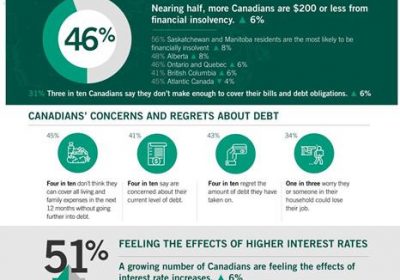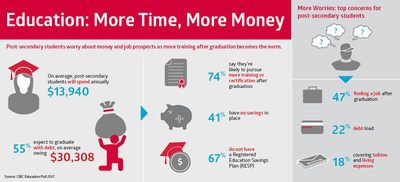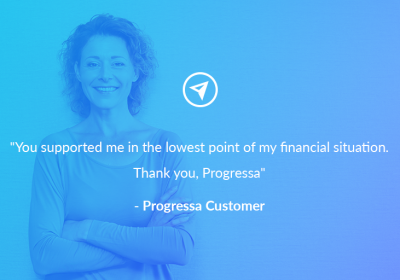
- Stats: 3238 0 31
- Author: Money Bloggess
- Posted: January 15, 2018
- Category: Debt
Blue Monday: One-in-five Canadians has a credit card balance larger than savings account
A national survey, commissioned by Financial Planning Standards Council (FPSC) and Credit Canada in time for Blue Monday (January 15), reveals that more than half (53%) of Canadians are already feeling financially blue, with the younger generations especially struggling.

Here are some of the standout findings:
- One-in-five Canadians (20%) has a credit card balance larger than their savings account.
- Younger adults aged 18-44 are especially blue about finances this time of year (68% versus 41% for those 45 and older).
- One-in-four Canadians (25%) do not have funds to escape the winter doldrums through a vacation.
- 6% of Canadians have already broken their financial new year resolutions.
- 21% of Canadians over-spent during the holidays.
“The upcoming month between Blue Monday and Valentine’s Day is often considered the saddest time of year, but it doesn’t have to be that way,” said author, personal finance educator and FPSC’s Consumer Advocate, Kelley Keehn. “If you need help determining appropriate actions towards your goals, you may want to seek out expert assistance from a CFP® professional. Regardless of your situation, you deserve financial wellness in 2018 and you’re never too young or old to get started.”
“Obviously, we are seeing a good deal of Canadians stressed out about their financial situation,” states Laurie Campbell, Credit Canada CEO. “The takeaway message is that there is hope. Develop a plan, tackle debt, and realize your financial potential. There are professional resources available to you, so don’t feel you need to go it alone.”
Tips to get in shape
If you’re looking to get in physical shape, you need to do three things:
- Weigh in and get real – where are you right now?
- Count your calories – what are you putting into your body and what is the junk that can be cut?
- Consider getting help – like a personal trainer.
And if you’re looking to get your finances in shape, you need to do three things as well:
- Weigh in financially – where are you, what do you owe, what interest are you paying? What’s your income, benefits – gather the basics for a snapshot of your financial affairs.
- Count your financial calories. Consider the 30-Day anti-budget, an exercise in awareness and behavioural change.
- Get help. There is a professional to help you regardless of your situation. If you are overwhelmed with debt, seek a non-profit credit counsellor and if you are ready to plan for the future, access a Certified Financial Planner® professional. These people will take away the taboo of talking money and put you at ease, eliminating any shame and embarrassment.
The key is, you don’t have to be in peak physical shape before you hire a personal trainer. Neither do you need to have your finances in order before you find a professional financial planner. The bottom line is you shouldn’t suffer alone.
Laurie Campbell and Credit Canada’s Tips to Combat Financial Blues
- Don’t panic. It’s better to deal with the problem sooner rather than later. Know that it will take time (and patience) to turn your financial situation around. Involve your family and partner and discuss how you can tackle this together.
- Get a plan. Set goals for yourself that support your long-term success, so you have a clear idea of where you’re headed financially.
- Create a monthly budget or spending plan. If you don’t have one, get one! You need to know where your money is going and monitor your spending. There are free resources online to help you build a monthly budget.
- Qualify your debt. Pay off high-interest debt first while continuing to make at least the minimum payments on your lower-interest credit cards. If possible, get a consolidation loan or line of credit at a lower interest rate to pay off all of your debt at once. Once it’s paid off cancel the credit cards.
- Get free help. Take advantage of free services and resources whenever possible. Non-profit credit counselling agencies, like CreditCanada.com, offer free credit and debt counselling services. We’ll create a budget for you and a plan of action to get you where you need to be.
- Stop using credit cards. Don’t add to your debt! Challenge yourself to refrain from using your credit cards, at least while you pay off any extra holiday debt owed. Use your debit instead. Cancel any credit cards that have no balance but charge an annual fee.
- Cut expenses where you can. Limit your spending to just the essentials, like groceries and other necessities. Consider cutting out gym memberships, subscriptions and services you no longer use, daily coffees and lunches, dining out, and consider switching to a cheaper mobile plan. You can use a free Budget Calculator to identify other areas you can cut.
- Boost your savings. That might mean selling items you no longer use or taking on a part-time job or side gig, like Uber, Uber Eats, Airbnb or Foodora.
- Monitor your progress. Keep track of your spending, savings, and how much debt you’ve paid off. It’s important to see (and celebrate) the small successes to help stay motivated.
The full results of the Financial Blues survey can be found here.
About Credit Canada
Credit Canada is a not-for-profit and charitable organization that provides free and confidential credit counselling, personal debt consolidation and resolutions, as well as preventative counselling, educational seminars, and tips and tools in the areas of budgeting, money management, and financial goal-setting. Credit Canada is Canada’s longest-standing not-for-profit credit counselling agency, helping Canadians manage their debt since 1966. Please visit www.creditcanada.com for more information.
About Financial Planning Standards Council
A professional standards-setting and certification body working in the public interest, FPSC’s purpose is to drive value and instill confidence in financial planning. FPSC ensures those it certifies―Certified Financial Planner® and FPSC Level 1® Certificants in Financial Planning―meet appropriate standards of competence and professionalism through rigorous requirements of education, examination, experience and ethics. With FPSC’s formal partnership with the Institut québécois de planification financière (IQPF), which is the only organization authorized to certify Financial Planners in Québec, there are more than 23,500 Financial Planners in Canada who have met, and continue to meet, FPSC’s standards. More information is available at FPSC.ca and FinancialPlanningForCanadians.ca.
About the Financial Blues Survey
Leger conducted a survey of 1550 Canadians between Jan 2 and 5, 2018 using its online panel, LegerWeb. A probability sample of the same size would yield a margin of error of +/-2.5%, 19 times out of 20. Leger’s online panel has approximately 475,000 members nationally – with between 10,000 and 20,000 new members added each month, and has a retention rate of 90%.
Websites
https://www.creditcanada.com/
http://www.financialplanningforcanadians.ca/
http://www.findyourplanner.ca/
http://www.kelleykeehn.com/
CFP®, Certified Financial Planner® and are certification trademarks owned outside the U.S. by Financial Planning Standards Board Ltd. (FPSB). Financial Planning Standards Council is the marks licensing authority for the CFP marks in Canada, through agreement with FPSB. All other ® are registered trademarks of FPSC, unless indicated. © 2017 Financial Planning Standards Council. All rights reserved.
SOURCE Financial Planning Standards Council
31 comments
Leave a Reply
You must be logged in to post a comment.




Thank you ever so for you article.Thanks Again. Awesome.
Thanks a lot for the article. Cool.
What as up to every single one, it as in fact a nice for me to go to see this web page, it contains priceless Information.
I was recommended this web site by my cousin. I am not sure whether this post is written by him as nobody else know such detailed about my difficulty. You are wonderful! Thanks!
“I really like this website! I love the content. .__________________________________ .Dayton Ohio Roofers”
very nice put up, i certainly love this web website, maintain on it
woh I enjoy your articles , saved to bookmarks !.
Way cool! Some very valid points! I appreciate you writing this write-up and also the rest of the site is extremely good.
Im grateful for the post.Really looking forward to read more. Much obliged.
Im thankful for the blog article.Much thanks again. Want more.
What a funny blog! I truly loved watching this humorous video with my family unit as well as with my friends.
I was suggested this web site by my cousin. I am not sure whether this post is written by him as nobody else know such detailed about my trouble. You are amazing! Thanks!
Just want to say what a great blog you got here!I ave been around for quite a lot of time, but finally decided to show my appreciation of your work!
The quality of this article is unsurpassed by anything else on this subject. I guarantee that I will be sharing this with many other readers.
Really appreciate you sharing this article post.Much thanks again.
You have observed very interesting points! ps nice internet site.
What as up i am kavin, its my first time to commenting anyplace, when i read this post i thought i could also make comment due to
Incredible points. Sound arguments. Keep up the good spirit.
Very informative blog.Much thanks again. Will read on
I seriously get pleasure from your posts. Thank you
Say, you got a nice blog article.Thanks Again. Cool.
Really informative blog.Really looking forward to read more. Much obliged.
Some really prime posts on this internet site , saved to favorites.
This is a topic that as close to my heart Thank you! Exactly where are your contact details though?
Pretty nice post. I just stumbled upon your weblog and wanted to say that I ave truly enjoyed browsing your blog posts. After all I will be subscribing to your feed and I hope you write again soon!
I simply could not leave your website before suggesting that I actually loved the usual information an individual supply in your guests? Is gonna be back regularly in order to inspect new posts
that has been a long time coming. It will strengthen the viability
Your web site provided us with valuable info to
Hmm it seems like your site ate my first comment (it was extremely long) so I guess I’ll just sum it up what I submitted and say, I’m thoroughly enjoying your blog. I as well am an aspiring blog blogger but I’m still new to the whole thing. Do you have any points for beginner blog writers? I’d really appreciate it.
Strange , your posting shows up with a dark hue to it, what shade is the primary color on your site?
Im grateful for the post.Thanks Again. Want more.